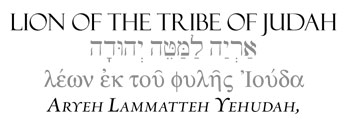Praying the Names of God - March 18
From Praying the Names of Jesus Week Fourteen, Day Two
The Name
Only once in the New Testament is Jesus described as a lion. The book of Revelation (named in part for what it reveals about Christ) portrays the risen Jesus as the only one worthy to open the scroll that contains the ultimate unfolding of God's purposes for the world. The apostle John perceived Jesus as both Lion and Lamb, who through his death and resurrection becomes the ultimate victor and conqueror. When you pray to Jesus as the Lion of the Tribe of Judah, you are praying to the One with the power to banish all fear, to the One who watches over you with his fierce protecting love. You are also praying to the One who is judge of the living and the dead.
Key Scripture
I wept and wept because no one was found who was worthy to open the scroll or look inside. Then one of the elders said to me, "Do not weep! See, the Lion of the tribe of Judah, the Root of David, has triumphed. He is able to open the scroll and its seven seals." Revelation 5:4 - 5
***
Tuesday
Praying the Name
When a trumpet sounds in a city,
do not the people tremble?
When disaster comes to a city,
has not the Lord caused it?
Surely the Sovereign Lord does nothing
without revealing his plan
to his servants the prophets.
The lion has roared —
who will not fear?
The Sovereign LORD has spoken —
who can but prophesy?
Amos 3:6 - 8
Whoever believes in the Son has eternal life, but whoever rejects the Son will not see life, for God's wrath remains on him. John 3:36
Reflect On: Amos 3:6-8 and John 3:36.
Praise God: For his power and his mercy.
Offer Thanks: Because you are no longer under God's wrath.
Confess: Any tendency to take mercy for granted.
Ask God: To reveal his love and mercy to friends and family members.
When it comes to using nature imagery to describe God, it is not surprising that Scripture pictures him sometimes as a great and mighty Lion. This image seems fitting, in harmony with the notion of his majesty and power. But it also fits an image of God that many people have grown up with, picturing him as a scowling, angry, impossible-to-please God.
But where on earth did this idea of a grumpy, implacable, even frightening God come from? Is it simply a psychological projection, the result of the emotional distance many of us feel from the father figures in our lives, or is there more to it? I would argue that this image of God is constructed from multiple sources: from our own wounded and guilt-ridden psyches but also from demonic distortions of God's character and even from the Bible itself.
It is hardly surprising, given our fallen condition, that many of us instinctively sense the gap between who we are and who we were meant to be. From there it is not difficult to imagine a disappointed and disgruntled Creator scowling down at us from lofty heights. And then there's the devil, ever intent on distorting God's image, painting the Lord according to his own likeness — prone to divine temper tantrums.
But what about the Bible? Doesn't an honest reading of Scripture, particularly the Old Testament, reveal a God who is often spoken of in terms of his wrath? Isn't this the God described as a mighty Lion, roaring in judgment against the nations and against his own faithless people?
Before we reach too hasty a conclusion about a supremely irritable Supreme Being, we should at least try to understand the meaning of the Greek word orge, translated as "wrath" in the New Testament. When Scripture talks about God's orge, it is not talking about the emotion of anger as we experience it. God's wrath is not primarily an emotion but rather a divine work of judgment that results when people adamantly resist him. God's wrath is his holy resistance to everything that is unholy.
Fortunately God has given us his Son to be both Lion and Lamb. As the Lamb he has taken the brunt of God's wrath, bearing it away so that we can experience God's mercy. But as the Lion he stands in judgment on all who persist in opposing God. As one commentator has pointed out, whoever accepts God's mercy is freed from his wrath. But whoever rejects mercy remains under wrath.
Today, as we contemplate Jesus, the Lion of the Tribe of Judah, let us thank him for going to the divine extreme of the cross in order to enable us to stop resisting the God who made us. Let us remember that we will be one day be judged according to how well we have responded to his grace, allowing it to shape our lives. Today, let us kneel before his majesty, determined to repent of our sins and to intercede for those who yet oppose him — family and friends who are still ignorant of his love and clueless of his mercy.
Check out Ann's newest books on AnnSpangler.com. To hear more from Ann Spangler, sign up today at annspangler.substack.com.
Meet your spiritual ancestors as they really were: Less Than Perfect: Broken Men and Women of the Bible and What We Can Learn from Them.









